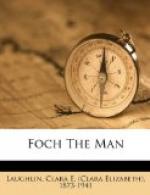Foch was writing in a notebook. He rose, when he had finished his entry among those epoch-making memoranda, and received his visitors. He had but a few minutes to give, yet he realized the importance of the occasion and treated it accordingly. These men were to send to millions of people in the great democracies of France, Britain and America their pen pictures of the man just invested with the greatest military responsibility any man in the world’s history has ever borne. Battles must be fought, but also those people had a right to such a sense of participation as only their press could give them; it was their issue; their attitude toward it was the foundation of their nation’s morale. Foch has neither time nor taste for talk about himself, but he is no war autocrat; he is, as he constantly reiterates, a son of France, defending human liberties. He might not have much time to give journalists, but it is not in him to minimize their place in a world where the will of the majority prevails and the press does much to shape that will.
His manner on that occasion was calm, unhurried, but very direct, to the point.
“Well, gentlemen,” said he, “our affairs are not going badly; are they? The boche has been halted since March 27. He has, doubtless, encountered some obstacle. We have stopped him. Now we shall endeavor to do better. I do not see that there is anything more to say.
“But as to yourselves, keep at your task. It is a time when everyone ought to work steadfastly. Work with your pens. We will go on working with our arms.”
“I regret,” wrote Lieutenant d’Entraygues in the Paris Temps, “only one thing: that all the people of France were not able to see and hear this soldier as he spoke to us. They would know why it is not possible to doubt our victory.”
It was probably about that time that Major Darnley Stuart-Stephens wrote of Foch, for the English Review.
“The man who has been consecrated by destiny to the saving from Moloch of this globe’s civilization, is he who will prove once more that in the conflict between the finely tempered sword and the finely tempered brain, it is the mental asset that will prevail.”
Major Stuart-Stephens had studied the “mental assets” of Ferdinand Foch.
“Now and again at his lectures.” he wrote, “I have noticed that far-away look of the mystic in his eyes that I remember so well in those of that other soldier-saint, Charles Gordon.”
It was that spiritual greatness in Foch which everyone felt, on which everyone brought into contact with him based his unfaltering faith in the outcome.
“We do not know,” says an editorial writer in the New York Evening Sun, “what the judgments of the military critics will be when they have carefully studied and sifted the evidence, but to a layman it looks as if Foch was not merely a very great general but one of the greatest generals of all recorded history . . . as great a general as Napoleon or Caesar or Hannibal or Alexander.”




